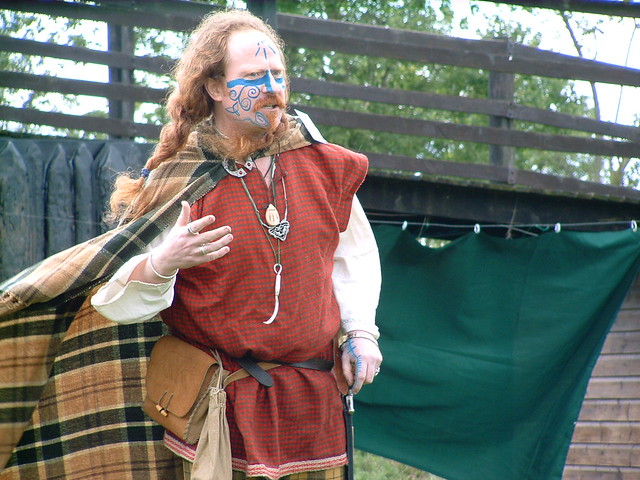Words for deer in Celtic languages. There were several different words for deer in Proto-Celtic: *wēdus, *karwos, *ellan(t)ī-, *danī- and *yorkos, and also *sidos (stag). They may have referred to different types of deer, but it is not certain which types, apart from *yorkos, which is a roe deer.
| Proto-Celtic | *wēdus [ˈweː.dus] = wild |
|---|---|
| Old Irish (Goídelc) | fíad [fʲiːa̯ð] = wild animals, game, especially deer |
| Irish (Gaeilge) | fia [fʲiə] = deer |
| Scottish Gaelic (Gàidhlig) | fiadh [fiəɣ] = deer |
| Manx (Gaelg) | feeaih = deer |
Etymology: from the Proto-Indo-European *weydʰ- (wood, wilderness) [source].
| Proto-Celtic | *karwos = deer, stag |
|---|---|
| Gaulish | caruus / carvos = deer |
| Old Irish (Goídelc) | carbh = deer |
| Irish (Gaeilge) | carria / cairrfhiadh = deer, stag |
| Scottish Gaelic (Gàidhlig) | cair-fhiadh / carbh-fheadh = hart, stag |
| Manx (Gaelg) | çharroo = stag |
| Proto-Brythonic | *karw = deer, stag |
| Old Welsh | *caru = deer |
| Middle Welsh (kymraec) | caru, carv, carw = deer, hart, stag |
| Welsh (Cymraeg) | carw [ˈkaru / ˈkaːru] = deer, hart, stag; lord, nobleman, patron |
| Old Cornish | caruu = stag |
| Middle Cornish | carow = stag |
| Cornish (Kernewek) | karow = stag |
| Middle Breton | caro, qaro = deer |
| Breton (Brezhoneg) | karv = deer |
Etymology: from the Proto-Indo-European *ḱerh₂wós, from *ḱerh₂- (horn) [source].
| Proto-Celtic | *sidos = stag |
|---|---|
| Old Irish (Goídelc) | séd = deer |
| Welsh (Cymraeg) | hydd = stag, hart |
| Breton (Brezhoneg) | heizes = roe-deer, venison, intrepid boy |
Etymology: uncertain
| Proto-Celtic | *ellan(t)ī- / *agliones = deer |
|---|---|
| Old Irish (Goídelc) | ag [aɣ] = bullock, cow, ox; deer, stag |
| Irish (Gaeilge) | agh = cow, ox agh alla = deer |
| Scottish Gaelic (Gàidhlig) | agh [ɤɣ] = heifer, hind |
| Welsh (Cymraeg) | eilon/eilion = stag, hart |
Etymology: possible from the same root as the English word eland (a type of antelope found in South Africa), which from the Dutch eland (elk), from the Old High German elent.
| Proto-Celtic | *ou̯ījkā = ? |
|---|---|
| Gaulish | cerua = ? |
| Old Cornish | euhic = hind, deer |
| Old Welsh | eguic = hind, deer |
| Welsh (Cymraeg) | ewig = hind, doe, roe; graceful light-footed woman; deer, hart |
Etymology: possibly from the Proto-Indo-European *h₂ówis (sheep) [source]
| Proto-Celtic | *yorkos = roebuck, deer |
|---|---|
| Gaulish | iorkos = deer |
| Proto-Brythonic | *jorx = deer, stag |
| Welsh (Cymraeg) | iwrch [jʊrχ] = roe-deer, roebuck |
| Old Cornish | yorch = roe-deer |
| Cornish (Kernewek) | yorgh = roe-deer |
| Old Breton | iorch = roe-deer |
| Breton (Brezhoneg) | yourc’h = roe-deer, venison, intrepid boy |
Etymology: from the Proto-Indo-European *york- (antelope, gazelle) [source].
| Proto-Celtic | *danī- = deer |
|---|---|
| Welsh (Cymraeg) | danas = deer, fallow deer |
| Breton (Brezhoneg) | demm = deer, fallow deer |
Etymology: related to the French daim (hind, doe), from the Latin dāma (fallow deer, buck, doe) [source]
Words marked with a * are reconstructions.
Sources: Wiktionary, Am Faclair Beag, MacBain’s Dictionary, In Dúil Bélrai English – Old-Irish Glossary, teanglann.ie, On-Line Manx Dictionary, Geiriadur Prifysgol Cymru, Gerlyver Kernewek, Dictionnaire Favereau



